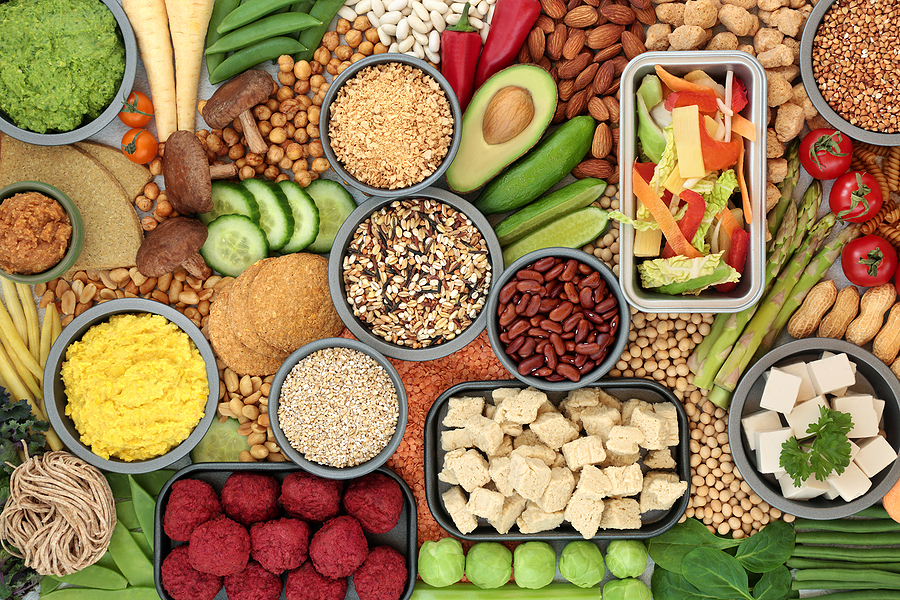10 Surprising Health Benefits of Swapping Meat for Plant Based Chicken
10 Surprising Health Benefits of Swapping Meat for Plant Based Chicken
Blog Article
All About Healthy Food: Benefits of Enjoying Plant Based Alternatives
The conversation bordering plant-based diet regimens has actually obtained substantial focus recently. Lots of individuals are checking out the potential health advantages, dietary advantages, and environmental influences connected with these nutritional options. As people come to be extra conscious of their food's influence on well-being and sustainability, inquiries develop regarding the practicalities of taking on such a way of life. What particular changes can one anticipate, and exactly how might these choices improve not just individual health yet likewise the planet's future?
Recognizing Plant-Based Diet Plans
Several people link plant-based diet plans mostly with vegetarianism or veganism, these diet plans can incorporate a large range of eating patterns that focus on whole, minimally refined plant foods. Such diets usually include fruits, veggies, whole grains, seeds, vegetables, and nuts, while eliminating or restricting pet products. This flexibility enables people to tailor their nutritional choices according to personal choices and dietary needs. Some may take on a mainly plant-based diet regimen while still occasionally consuming meat or dairy products, often described as a flexitarian approach. The focus stays on including even more plant foods, which can lead to a diverse variety of dishes and tastes. Comprehending these different analyses of plant-based consuming is essential for appreciating its availability and allure in modern food society.
Health Advantages of Plant-Based Foods
The health and wellness benefits of plant-based foods are considerable, using a nutrient thickness benefit that sustains total health. Study shows that these foods can improve heart health and play a vital duty in effective weight monitoring. By incorporating a lot more plant-based choices, individuals may improve their nutritional options and advertise long-term health.
Nutrient Density Benefit
Nutrient thickness plays a vital duty in the health and wellness benefits of plant-based foods, making them a compelling choice for those looking for a well balanced diet. Plant-based foods, such as fruits, vegetables, beans, nuts, and whole grains, are typically abundant in vital vitamins, minerals, and antioxidants while being reduced in calories. This high nutrient thickness allows people to take in less calories while still satisfying their nutritional needs. Additionally, these foods are packed with nutritional fiber, promoting digestion health and wellness and aiding in weight monitoring. By incorporating nutrient-dense plant-based options, consumers can enhance their overall health and wellness, sustain their immune systems, and decrease the risk of chronic diseases. Inevitably, the nutrient thickness of plant-based foods underscores their importance in a health-conscious way of life.
Heart Health And Wellness Improvement

Weight Administration Support
In addition to promoting heart health and wellness, a plant-based diet plan can substantially aid in weight management. This nutritional technique highlights entire foods such as fruits, veggies, legumes, nuts, and whole grains, which are generally lower in calories and higher in fiber compared to animal-based items. The high fiber web content assists raise satiation, decreasing overall calorie intake. Additionally, plant-based diets are usually rich in essential nutrients while low in unhealthy fats, making it less complicated to preserve a healthy and balanced weight. BBQ Sauces. Study indicates that people that adopt a plant-based way of life have a tendency to have reduced body mass indexes (BMIs) and experience more successful fat burning compared to those who take in meat-heavy diet plans. Accepting plant-based choices is a calculated selection for reliable weight management.
Nutritional Value of Plant-Based Ingredients
Plant-based ingredients are rich in vital nutrients, using a varied selection of vitamins, minerals, and anti-oxidants that add to total wellness. A contrast of healthy protein resources discloses that while animal items are often considered as exceptional, lots of plant-based choices supply appropriate healthy protein and other helpful substances. Comprehending the nutritional value of these ingredients can aid people make notified dietary choices.
Important Nutrients in Plants
Nutrient-rich ingredients found in plants supply a varied variety of vital minerals and vitamins that contribute greatly to total wellness. These components are rich in vitamins A, C, and K, which sustain immune feature, vision, and blood clotting, respectively. Additionally, plants supply essential minerals such as potassium, magnesium, and calcium, crucial for heart wellness, muscle mass feature, and bone stamina. The presence of fiber in plant-based foods help digestion and advertises a healthy gut microbiome. Anti-oxidants, found perfectly in veggies and fruits, assistance fight oxidative tension and reduce swelling. Moreover, lots of plant foods are low in calories yet high in nutrients, making them a superb choice for those looking for to maintain a healthy weight while ensuring suitable nutrient intake.
Contrasting Healthy Protein Resources
Protein sources vary considerably in their dietary accounts, with plant-based components providing distinct advantages. Unlike pet healthy proteins, which typically include saturated fats and cholesterol, plant proteins often tend to be reduced in these unhealthy components. Legumes, nuts, seeds, and entire grains are rich in important amino acids, fiber, vitamins, and minerals. Lentils offer high protein web content together with significant iron and folate, while quinoa is a full protein, supplying all nine important amino acids. In addition, plant-based proteins are often come with by antioxidants and phytochemicals that sustain overall wellness. The shift to plant-based healthy protein sources not just enhances dietary intake however also straightens with sustainable nutritional techniques, minimizing environmental effect and advertising long-lasting wellness benefits.
Ecological Influence of Plant-Based Eating
As recognition of climate modification expands, numerous people are exploring sustainable nutritional choices that can significantly decrease their ecological footprint. Plant-based eating has actually become a considerable contributor to decreasing greenhouse gas discharges, which are mainly related to livestock manufacturing. The cultivation of fruits, grains, veggies, and legumes generally calls for less sources, such as water and land, compared to pet farming. In addition, plant-based diet plans can lead to decreased logging, as less land is needed for grazing animals or growing animal pop over to these guys feed. By moving towards plant-based choices, customers can support biodiversity and promote healthier communities. Overall, welcoming plant-based consuming not only advantages individual wellness yet additionally represents an important action toward ecological sustainability and preservation efforts.
Overcoming Common Misconceptions
While lots of individuals acknowledge the benefits of a plant-based diet, a number of misconceptions frequently prevent them from completely accepting this lifestyle. A common belief is that plant-based diet regimens do not have enough protein; nevertheless, various plant sources, such as beans, nuts, and tofu, offer sufficient protein. In addition, some presume that this diet regimen is costly, when as a matter of fact, staples like beans, rice, and seasonal vegetables can be fairly cost effective. Another this link misunderstanding is that plant-based consuming is excessively limiting, whereas it actually uses a varied selection of foods and flavors. Lastly, lots of fret that a plant-based diet regimen may result in shortages, yet with proper preparation, people can obtain all needed nutrients, including nutrients, while taking pleasure in a vast variety of tasty dishes.
Tips for Transitioning to a Plant-Based Way of living
Making the change to a plant-based way of life can be an improving experience, though it frequently requires some support to navigate the preliminary adjustments. First, individuals are motivated to start progressively, including even more fruits, veggies, beans, and entire grains right into their dishes while minimizing meat and dairy products intake. Dish preparation is crucial; preparing a regular menu can help ease the adjustment and protect against last-minute undesirable options. Exploring new recipes and cooking techniques can likewise improve the experience and keep exhilaration regarding plant-based eating. In addition, signing up with support system or areas can give inspiration and share valuable pointers. Staying notified about nutrition warranties well balanced meals, protecting against shortages while cultivating a healthy and balanced, satisfying plant-based way of life.

Delicious Plant-Based Dish Concepts
Exploring delicious plant-based meal concepts can motivate people to welcome an extra nutritious diet plan. One popular option is a passionate quinoa salad, including cherry tomatoes, cucumber, and a vibrant lemon-tahini clothing. One more favorite is a tasty lentil stew, loaded with carrots, celery, and aromatic natural herbs, perfect for a comforting supper. For breakfast, over night oats made with almond milk, chia seeds, and covered with fresh berries offer a nutritious beginning to the day. Furthermore, a dynamic vegetable stir-fry with tofu and a range of vivid veggies can be a fast yet pleasing meal. Lastly, velvety avocado toast on whole-grain bread, sprayed with spices and seeds, offers an easy yet flavorful treat. These meals display the variety and richness of plant-based eating.

Frequently Asked Inquiries
Can a Plant-Based Diet Regimen Offer Enough Healthy Protein?
The concern of whether a plant-based diet can provide enough protein is common. Various sources, consisting of beans, nuts, seeds, and whole grains, can fulfill protein requires successfully, supporting a nutritious and well balanced diet for people.
Are Plant-Based Diet Plans Ideal for Children?
The viability of plant-based diet plans for youngsters depends upon careful preparation. Adequate nutrients need to be guaranteed, consisting of minerals, vitamins, and proteins. With appropriate guidance, such diet plans can sustain healthy development and development in kids.
Just how Do I Dine Out on a Plant-Based Diet regimen?
Eating in restaurants on a plant-based diet plan involves looking for dining establishments with diverse food selections, requesting for modifications, and checking out vegan-friendly alternatives. Planning ahead and connecting dietary preferences can improve the eating experience while maintaining dietary choices.
What Are Common Allergens in Plant-Based Foods?
Typical irritants in plant-based foods consist of soy, gluten, nuts, and seeds - Gluten Free BBQ Sauce. People look at this web-site following a plant-based diet plan must recognize these allergens and read labels very carefully to stay clear of damaging reactions and guarantee risk-free usage
Can Plant-Based Diets Assist With Weight Loss?
Research indicates that embracing a plant-based diet plan may assist in fat burning as a result of its generally lower calorie density and higher fiber content. This combination can boost satiation, aiding people handle their caloric consumption effectively. Numerous people connect plant-based diet plans primarily with vegetarianism or veganism, these diet plans can encompass a broad range of eating patterns that focus on entire, minimally refined plant foods. Nutrient density plays a necessary function in the health and wellness benefits of plant-based foods, making them a compelling selection for those looking for a well balanced diet plan. Plant-based diets have been revealed to markedly boost heart wellness, as they commonly consist of aspects that support cardio feature. In addition to advertising heart wellness, a plant-based diet plan can considerably assist in weight monitoring. A typical belief is that plant-based diet regimens lack sufficient healthy protein; nevertheless, numerous plant resources, such as vegetables, nuts, and tofu, provide enough healthy protein.
Report this page